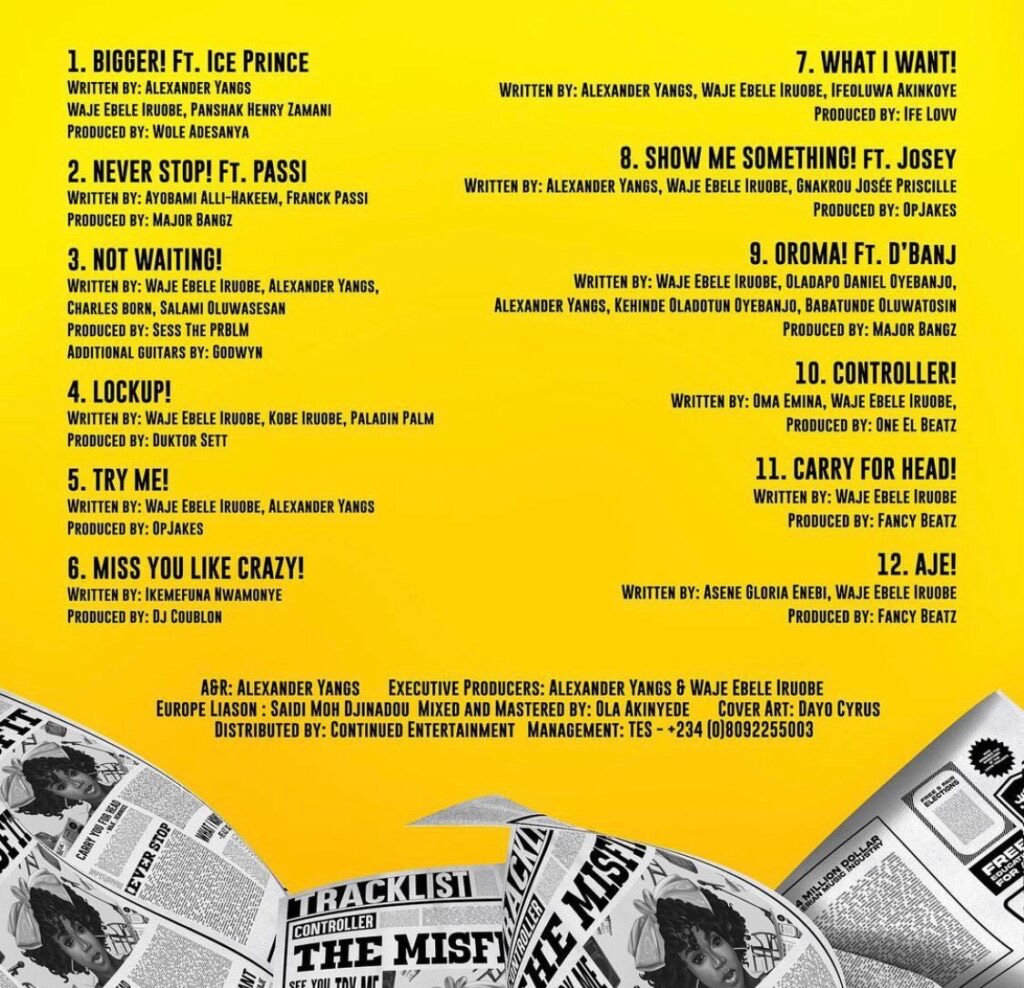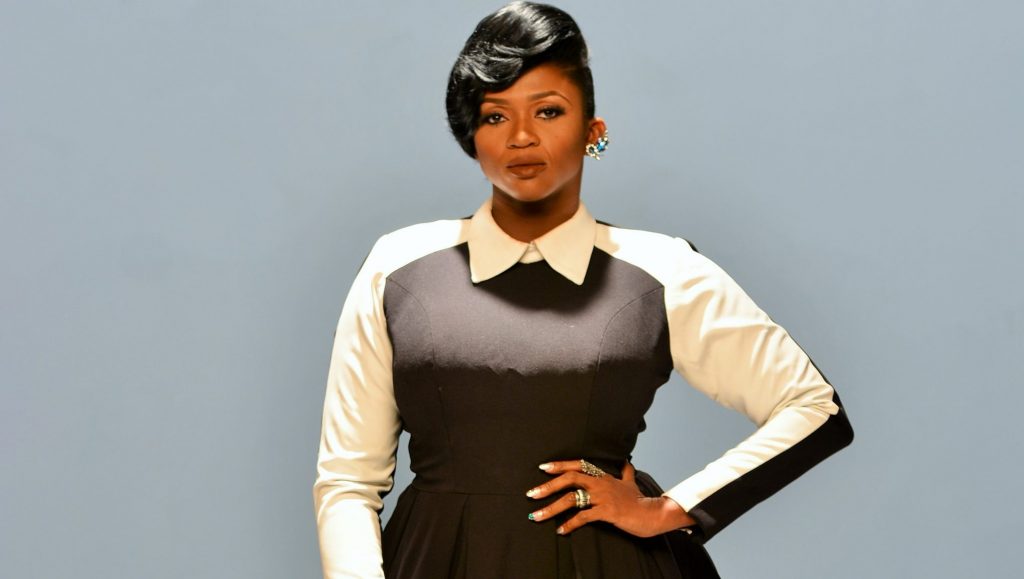The Misfit is an album that symbolises Waje’s current plight as an artiste. The album’s highs are sky-high. However, inconsistent song-writing and production mean that the drops in quality can be very pronounced…
By Yinoluwa Olowofoyeku
Aituaje Aina Vivian Ebele Iruobe is a well-known persona in the Nigerian music industry, but perhaps not by that name. You’re more likely to recognize her as Waje, a name formed as an acronym of “Words Aren’t Just Enough.” Waje is a multi-award-winning singer, songwriter, vocalist, and philanthropist. Last year, she set something of a record, releasing three full studio albums in the span of five months; beginning with Waje 2.0 in July, and Unbroken on her birthday, September 1. She completes the record-setting trilogy of releases with The Misfit.
Waje is reputed to be one of Nigeria’s most talented vocal performers, boasting prodigious vocal range, (a range that comfortably spans three octaves; which is a big deal) and undeniable vocal chops. The talent was evident right from her youth where she wowed audiences on various stages from school to church. Her unique gift means that she is not limited by genre and has made a habit of flexing her stylistic muscles across Blues, Soul, R&B, Gospel, and more.
She broke into the industry in the late 2000’s, making an instant mark with feature appearances on Banky W’s “Thief My Kele,” P-Square’s timeless hits, “Omoge Mi” and “Do Me,” and, perhaps most memorably of all, M.I Abaga’s “One Naira.” After her initial splash and a bevy of awards, the road has turned out a bit rocky for the talented songstress. There were even rumours in 2019 of her deciding to step away from music totally. Thankfully, considering her output in recent years, it seems like she is back to stay, cementing her intentions with The Misfit.
(Read also: Zinoleesky Makes Emphatic Bid for Timelessness with Grit & Lust EP)
The album begins with what is intended to be an epic motivational opener, “Bigger!” Wole Adesanya provides an emphatic uplifting instrumental characterised by deep rumbling basses, sweeping orchestral strings, and energetic cinematic drums. Over this instrumental monument, Waje’s vocals stand tall. She understands that her voice is her greatest asset, and she wields it confidently, delivering rich, strong passages accompanied by opulently layered harmonies and gymnastic runs. Ice Prince appears to turn in a fitting verse, adding a composed swagger to the marching energy of the song. An element that embodies the militaristic encouragement the song conveys is a certain group vocal that instructs “Eyes right! Stand straight! Belle in! Chest out!” This song is admittedly unconventional, but it serves surprisingly well as an opening track, initiating the listening experience with invigoration.
Next up is the Major Bangz-produced “Never Stop!” Waje enlists accomplished Congolese rapper, Passi for a smooth French verse that espouses the prevailing power of love. The instrumental is a decent afroswing affair built on a repetitive guitar pattern that is supported by simple drums and light percussive elements. The chorus includes sliding 808 basses that feel a bit awkward against the flatness of the kick drum chosen. Waje continues along the inspirational lines singing, “Can’t hold me down, Don’t let the troubles that come my way push me down no, Headed to the to, No I never stop, Don’t let no worries no worries, Come between me and shining like the morning sun, No I never stop.” She doesn’t do much of interest with her verse, using harmonies and vocal embellishments in an attempt to spice up unremarkable melodies.

The third track is “Not Waiting!” and it is a stellar funky dance number produced by Sess (of Falz fame). He sets the mood with groovy dance drums set over a fabulous synth bassline and sparkly string pads. Godwyn adds guitar licks and flourishes to complete the fantastic instrument. Thankfully, Waje rises to the occasion, with simple yet effective lyrics carried emphatically by her vocal prowess and catchy melodies. She sings from the perspective of a woman who knows her worth, telling her lover “I won’t let you under my skin, You should know by now that I’m that prize, No more living lies no, She is a trophy at the end of the race oh, Available not to you.”
Track 4 is “Lockup!,” a mid-tempo Afrobeats romp produced by Duktor Sett. Waje displays her adaptability by adjusting her delivery to expertly match the genre of the song, focusing on short melodic phrases with simple rhymes, relatable lyrics, and brief harmonies. The subtle mallets and keys of the instrumental combine beautifully with an understated drum pattern to provide a fitting sonic backdrop over which Waje can vibe, explaining how she’s unbothered by the person in question, singing “Me I no dey claim wetin I go gain, Me I no be shalanga me I just dey mind my biz for the game, No dey complain wetin I go gain, You see you no dey bother me.”
Next up is “Try Me!,” a track on which Waje allows her soulful emotional side come to the fore. With sweet loving melodies, Waje cajoles a potential lover to take a chance on her, singing “You had your trust broken. Let me mend it. Nothing else to prove, no need to blend in. Love this love this love go sweet you I know, E go sweet me pass o.” Waje comes across sincere and convincing in her delivery; however, the instrumental lets her down. The instrumentals are comprised mainly of very static guitar chords and uninspired Afrobeats drums. They just don’t match the fluidity and emotion that Waje’s vocals bring to the song. A stronger instrumental showing could have elevated this song to the status of love songs that people use to communicate feelings they’re too timid to express by themselves.
The midpoint of The Misfit is marked by “Miss You Crazy!,” a wonderfully expressive tale about missing a loved one. The lyrics are pregnant with honesty and creative imagery as Waje confesses, “Gradually I dey mad. Secretly I dey die. Na which day you dey come oh, Boy I really need to see you, Cause I no be myself, It’s like my soulno dey for my body oh. Boy I really need to see you.” The emotions of the lyrics are heightened by stellar vocal delivery and masterful backing harmonies. DJ Coublon’s instrumentals must also be praised. He brings his signature liveliness to the instrumentals, using playful plucks, expressive guitars, and bold brass to prop up bubbly percussion-driven drums. The parts of this song combine into what is my favourite from the project.
(Read also: Mavin Records’Chapter X is a Showcase of the Current Mavin Class)
“What I Want!” begins with soulful electric piano chords that combine with zesty mallets, a deep smooth bassline, and Caribbean-inspired drums to form the instrumentals provided by Ife Lovv. Sadly, this time, Waje is the one that falls short of the bar set by the instrumentals. She doesn’t do too much of note melodically or lyrically on this song, and it feels like a missed opportunity.

Next up is “Show Me Something!,” a song that finds Waje and Ivorian singer, Josey inviting the self-proclaimed big boys to back up their talk by showing the money. This is another song that ends up being middle of the road. While the lyrics are very on-topic with lines like “Braggy braggy, See your see all this your posing posing, Mr Money Money, See your one dollar is falling falling …If you say you carry something, If na money then show me something. I no mind if you spray me something, Chairman oh.” Waje’s delivery is actually quite varied and interesting, but it doesn’t lift the song past its first gear. Josey’s sultry singing provides a different dimension to the song beyond its confrontational energy provided by the instrumental that sounds oddly dated.
Major Bangz returns on the ninth track, “Oroma!” with a boisterous and funky instrumental built around a pulsating synth bassline, bright brass passages, a lot of jazzy flourishes, and exuberant percussions. Waje matches the beat’s energy with braggadocious lyrics about living the high-life, singing “Every other day we party hardy, Make money and then faaji, ‘Cause I’m feeling lucky tonight.” The chorus of the song is a melodic, bright spot on an already superb song, with angelic group vocals harmonised to perfection. To provide the icing on the cake, Waje recruits the Koko Master himself, D’Banj, to lend his signature swagger to this track. He knocks it right out of the park.
Track 10 turns the mood around with “Controller!,” a heartfelt plea for freedom from a lover’s hurtful grasp. The understated Amapiano-tinged instrumental comes courtesy of One El Beatz, and features subtle reversed keys, reverbed horns, rolling log drums, and delicate percussions. Waje expresses frustration and disbelief in her lyrics, singing “Tryna keep you, Running around tryna please you. Boy, think it’s time to leave you, Can’t believe you” in tender tones and mellow melodies. This song shows that Waje’s voice can demonstrate tangible emotion without her having to resort to vocal theatrics. The subtlety of the instrumentals is perfectly matched by her delivery. It also means that the moments where she varies her rhythms and timbre really stand out as highlights of the song.
“Carry for Head!” is another offering from Waje the romantic as she explains to her lover that his position in her life is uncontested. “Beat your chest, No body fit contest, I go carry you for head oh, I know I know you can hear me now oga oh,” she instructs over Fancy Beatz’s guitar-driven Afrobeats instrumentals. While this song doesn’t quite reach the heights attained by some of the other highlights of the album, it also doesn’t quite fall to the level of average. She employs varied cadences that are very catchy in some places, and the instrumental is delightful in its own right. It gets a bit crowded with embellishments at times but it mostly succeeds in complementing Waje’s efforts on the song.
Waje rounds off The Misfit with another Fancy Beatz production on “Aje!” He provides another instrumental filled with various drums and percussions, but they don’t create a cacophony. They work together well to provide a unique bounce over simple chord progressions and brass accompaniment. As the final song, Waje takes this opportunity to speak on her successes and attributes them to heavenly favour, singing “Grace has me feeling so good so good. Everything I’ve ever been heaven has been watching me yeah.” She also throws in some self-aggrandising to cap it all off, boasting “Say my name say Waje, I’m the best among the best, I’m with the best that’s why they can’t stop me.”
(Read also: Fridayy Tells an Impressive Story in Lost in Melody)

And she’s right; it seems hard to stop her. Amidst different dips and resurgences, Waje has continued to ply her trade in the industry. It is a common discussion as to whether she is underrated, or why she doesn’t seem to be at the top in terms of commercial success despite her immense and undeniable talent. I think the reason can be observed in The Misfit. Waje’s biggest drawback is inconsistency. The songs across this album (and further across the trilogy it completes) vary wildly in terms of quality and appeal. Her 2018 album, Red Velvet, was an extremely coherent and consistent offering, demonstrating an evident focus. There was one song on that project where she tried something different and stumbled a bit, but that is to be expected. The Misfit is riddled with more of those kinds of stumbles. With the talent she possesses, when a track comes together, it does so magnificently as a marriage between good production and well-worked songwriting. Consequently, it is obvious when it doesn’t quite congeal.
Waje’s singing is never at fault, though. Her vocal chops are infallible, and so it then comes down to what she does with her vocals and what the production around it is like. The Misfit is an album that symbolises Waje’s current plight as an artiste. Her singing voice is exquisite from top to bottom. The album’s highs are sky-high. However, inconsistent song-writing and production mean that the drops in quality can be very pronounced. For Waje to take the place that her talent affords her, she will have to be much more intentional about maintaining a high, consistent standard with what she puts out.
Lyricism – 1.2
Tracklisting – 1.1
Sound Engineering – 1.1
Vocalisation – 1.7
Listening Experience – 1
Rating – 6.1/10
Yinoluwa “Yinoluu” Olowofoyeku is a multi-disciplinary artist and creative who finds expression in various media.




